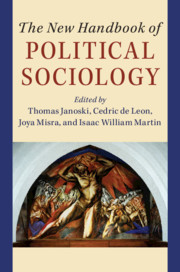Book contents
- The New Handbook of Political Sociology
- The New Handbook of Political Sociology
- Copyright page
- Dedication
- Contents
- Tables
- Figures
- Contributors
- Acknowledgments
- Introduction
- I Theories of Political Sociology
- II Media Explosion, Knowledge as Power, and Demographic Reversals
- III The State and Its Political Organizations
- IV Civil Society: The Roots and Processes of Political Action
- V Established and New State Policies and Innovations
- 30 The Evolution of Fiscal and Monetary Policy
- 31 Welfare State Policies and Their Effects
- 32 Sexuality, Gender, and Social Policy
- 33 Migration, Asylum, Integration, and Citizenship Policy
- 34 Cosmopolitanism and Political Sociology
- 35 War, States, and Political Sociology
- VI Globalization and New and Bigger Sources of Power and Resistance
- Index
- References
30 - The Evolution of Fiscal and Monetary Policy
from V - Established and New State Policies and Innovations
Published online by Cambridge University Press: 22 February 2020
- The New Handbook of Political Sociology
- The New Handbook of Political Sociology
- Copyright page
- Dedication
- Contents
- Tables
- Figures
- Contributors
- Acknowledgments
- Introduction
- I Theories of Political Sociology
- II Media Explosion, Knowledge as Power, and Demographic Reversals
- III The State and Its Political Organizations
- IV Civil Society: The Roots and Processes of Political Action
- V Established and New State Policies and Innovations
- 30 The Evolution of Fiscal and Monetary Policy
- 31 Welfare State Policies and Their Effects
- 32 Sexuality, Gender, and Social Policy
- 33 Migration, Asylum, Integration, and Citizenship Policy
- 34 Cosmopolitanism and Political Sociology
- 35 War, States, and Political Sociology
- VI Globalization and New and Bigger Sources of Power and Resistance
- Index
- References
Summary
Fiscal and monetary policy are among the most basic tools governments use to manage their economies. These tools have evolved in dramatic fashion during the twentieth and early twenty-first centuries. This chapter examines that evolution and its implications for socioeconomic performance. I begin by explaining what these tools are. Second, I discuss the basic debates about how they ought to be used and how the general approach to fiscal and monetary policy evolved from the Keynesian era beginning roughly in the 1930s to the neoliberal era beginning in the late 1970s. My intention is not to delve into the intricacies of economic theory or the minutiae of economic policy but rather to summarize these things with broad strokes.
- Type
- Chapter
- Information
- The New Handbook of Political Sociology , pp. 787 - 811Publisher: Cambridge University PressPrint publication year: 2020
References
- 1
- Cited by

